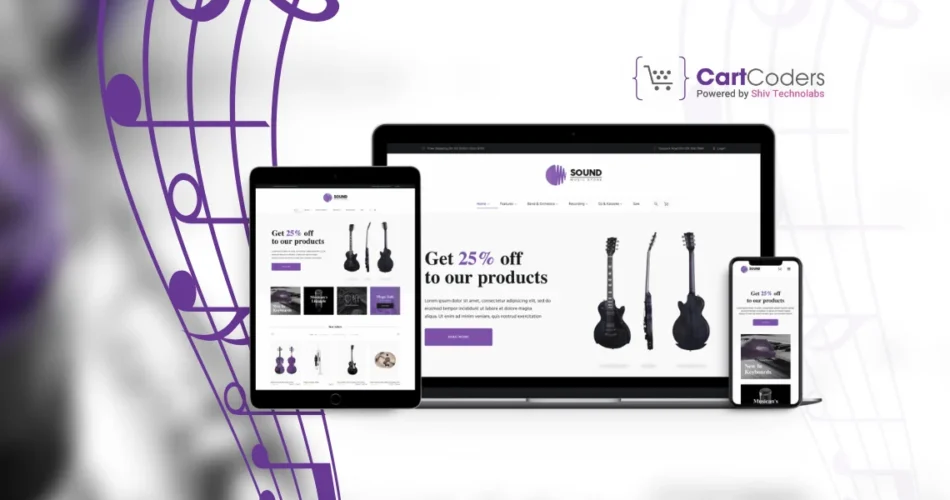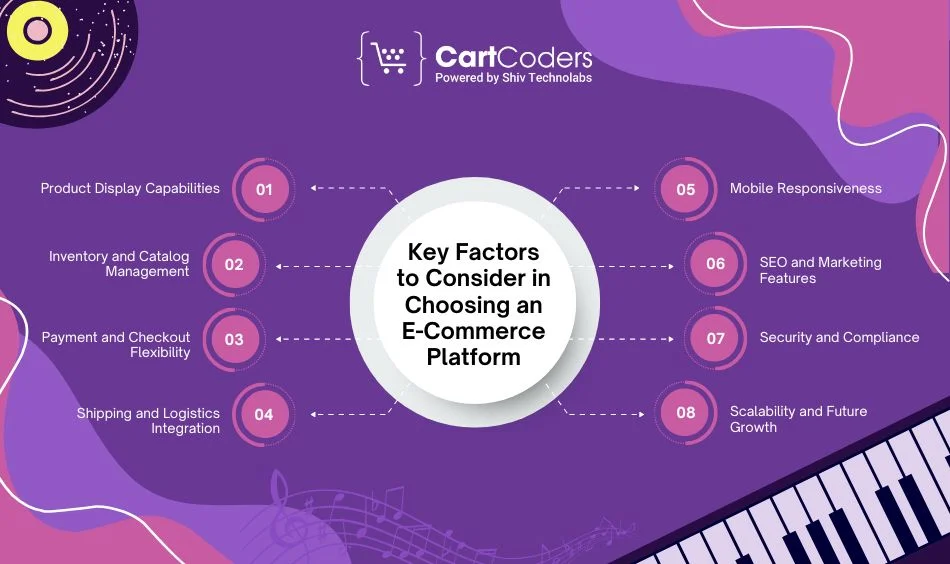Custom Engagement Solutions
Unlock tailored solutions with a free, no-obligation strategy session.
Expert Developers & Engineers on Demand
Scale Your Team with Skilled IT Professionals
Expert Guidance for Digital Transformation

Selling musical instruments online is no longer a niche project. With guitar and piano products giving way to DJ controllers and advanced sound systems, online selling is evolving. Looking to sell musical instruments online? The first step towards this is selecting the Best e-commerce platform for musical instruments.
Choosing reliable eCommerce platforms for selling musical instruments is important as it brings speed and efficiency in helping customers explore the products and make the purchase.
According to reports, global online sales of musical instruments are projected to cross $25 billion by 2030. But without choosing the right platform, you can’t even make even 1% of these massive figures. The best platform for music store products comes with impressive features, boosts user experience and eases the payment gateway. At CartCoders, the premier Shopify development company, we can help you select the ideal platform and establish an online store for musical instruments.
Keep reading, as here we will explore ways to choose the Best e-commerce platform for musical instruments.
Getting hands on a reliable ecommerce platform helps in easing the journey of customers to purchase the products. Below we have listed the top reasons for choosing the ecommerce platform for selling musical instruments online:
Making the right decisions will make your store prepared not only for the present but to the future.

Selecting an e-commerce platform is not a matter of choosing a famous name. The platform that you choose will dictate the ease with which your online store will run, how well it can scale and how it will attract customers.
These considerations are even more pressing when it comes to sellers of musical instruments, as such items tend to have extensive catalogs, expensive transactions, and also require rich media displays such as pictures, videos, and even sound clips. The following are the most crucial considerations that you ought to make before making your judgment.
Musical instruments are both visually and audibly appealing. Visitors usually desire the opportunity to view minute details of a guitar’s finish or listen to sound samples of a keyboard. On your platform, it should be simple to:
The closer the product experience, the greater is the likelihood that the browsers can be transformed into buyers.
The instrument sellers are usually dealing in a huge range of products, including small ones, such as picks and strings, or huge, such as the piano and the drum set. The platform that is powerful guarantees the ease of managing the catalog in terms of:
Lack of strong inventory control means that your store will lose customer trust.
The musical instruments are priced differently, and the purchasers are inclined towards flexibility in payment. The proper platform will entail:
Convenience, safety, and hassle-free payment experiences directly influence conversion rates.
Delivery of musical instruments presents its own set of problems as most of the goods are delicate, heavy, or costly. Find platforms with:
The seamless logistics integration instills confidence and eliminates delivery issues.
Over 70 percent of online shopping is being conducted with the help of mobile devices. Without optimizing your store for mobile, you will be losing a big chunk of your potential business. A mobile-friendly platform guarantees:
The ability to be found online is crucial for the expansion of an online music shop. The platform you have selected must have the capabilities to:
These will decrease the use of paid ads and increase the organic flow to your store.
Trust is essential during high-value purchases that customers do through the Internet. Your platform must be designed to be highly secure, including:
Good security will reassure the customers that their information and finances are safe.
What you may have today is a handful of instruments in your store, but how would it be when your business expands? The platform should support:
The decision to go with a scalable solution aids in avoiding the expensive migrations in the future.
Here we have compared leading ecommerce platforms for musical instruments:
| Platform | Strengths | Weaknesses | Best For |
| Shopify | User-friendly, large app store, strong SEO tools | Transaction fees, limited customization | Beginners & small to mid-sized music stores |
| Magento (Adobe Commerce) | Highly customizable, scalable, enterprise-ready | Requires technical expertise | Large businesses with complex catalogs |
| WooCommerce | Flexible, WordPress-based, good for content + commerce | Needs plugins for advanced features | Small to medium music sellers focused on content marketing |
| BigCommerce | Built-in SEO, no extra transaction fees, multi-channel selling | Limited free themes | Growing stores needing advanced features without heavy coding |
Each platform has merits, but the choice depends on budget, growth plans, and technical capacity. At CartCoders, we are your go-to Shopify development company, helping you build a fast-loading online store.

Choosing a platform is daunting when you are preoccupied with handling products, suppliers, and customers. CartCoders simplifies the work by:
At CartCoders, we have a team of leading Shopify and ecommerce developers helping businesses scale with world class ecommerce development services.
Selling musical instruments online is no longer a hassle when you choose the right ecommerce platform. At CartCoders, we have you covered with developing top top-quality ecommerce store with a great user experience to boost sales for your store.
As a leading e-commerce development company in USA, we have helped startups and large businesses scale with feature-rich e-commerce development services. Ready to sell more instruments online at a click? Contact CartCoders today and let us build the perfect platform to boost your business sales.
FAQs
Shopify is one of the best ecommerce platforms to sell musical instruments online. Shopify is suitable for small to medium sellers.
Select an e-commerce platform with robust inventory capabilities, including bulk uploads, real-time updates, and attribute management. Applications are efficient in managing complicated catalogs.
Yes. The Shopify platform is an ideal choice that allows you to sell musical instruments across the globe. The platform combines multi-currency payments, international shipping providers, and compliance functionality to support global sales.
SEO plays an important role in boosting your music store to the top of the search engine results. So whenever users search for instruments, your store arrives at the top of the page which leads to improved sales.
CartCoders has a team of expert developers with experience in developing stores across leading industries. From initial design to development, we assist music retailers in designing online stores that drive real growth.
Projects delivered in 15+ industries.
95% retention rate, building lasting partnerships.
Serving clients across 25+ countries.
60+ pros | 10+ years of experience.